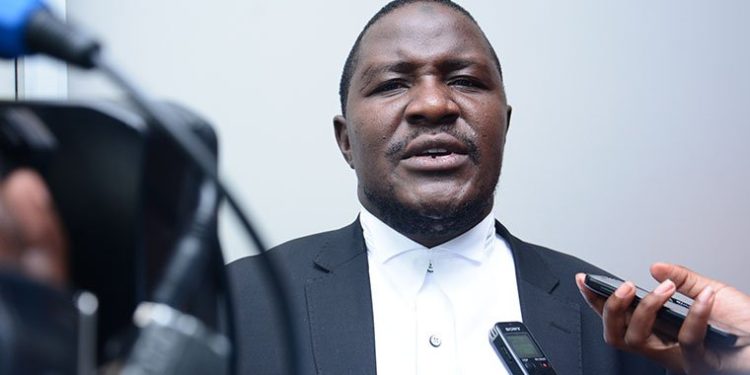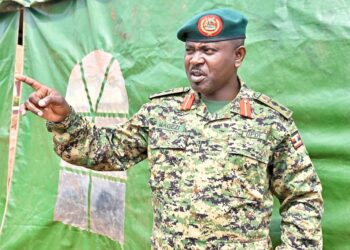By THE OBSERVER UG
ASUMANI BASALIRWA, the member of parliament for Bugiri municipality, found himself in a surprising turn of events last month when the National Unity Platform (NUP) leadership dropped him from his position as the deputy chairperson of the Public Accounts Committee (PAC).
In an exclusive interview with Muhammad Kakembo, Basalirwa expressed his bewilderment at the decision, asserting that his removal couldn’t be attributed to poor performance but, rather, to undisclosed reasons.
Basalirwa further elaborated that while he had no objections to his removal, he had expected NUP to communicate the decision to him in a more considerate manner before it became public knowledge. Despite the absence of an official explanation for his removal, speculations arose due to NUP leader Robert Kyagulanyi’s recent criticism of MPs who had supported the Anti-Homosexuality Act, which he claimed was introduced to target him.
During a press conference convened to clarify statements made during an earlier appearance on the British public broadcaster, the BBC, Kyagulanyi had openly criticised the MPs who had endorsed the bill, accusing them of working in favour of President Museveni. He specifically pointed out that some MPs, who had played a significant role in crafting the legislation, were surprisingly less vocal against human rights violations on other fronts.
In the aftermath of the BBC interview, Basalirwa’s party, the Justice Forum, penned a strongly-worded letter criticizing Kyagulanyi’s stance. They affirmed that they had no qualms with Kyagu-lanyi’s support for LGBTQ+ rights but urged him to do so without undermining his colleagues in the opposition by portraying them as collaborators of President Museveni.
In his recent interview, Basalirwa responded to accusations of working for Museveni, vehemently denying any such alliance. He argued that anyone suggesting Museveni required specific laws to prosecute his political opponents misunderstood the president’s character and methods.
The developments surrounding Basalirwa’s removal from his position and the broader implications of political dynamics within NUP continue to unfold, leaving room for further examination of Uganda’s political landscape.
How do you interpret the recent reshuffle of the shadow cabinet, especially considering that you have been excluded?
Approximately 30 years ago, when I embarked on my journey in the struggle, my motivation was never rooted in the pursuit of positions. Rather, and both then and now, our driving force remains dedicated service and unwavering commitment to the cause. Positions, to me, have always held a secondary significance.
When tasked with an assignment, I wholeheartedly carry it out, and when it’s assigned to someone else, I accept it without attaching undue importance. I’ve never regarded this as a major issue, for it aligns perfectly with the ethos of the struggle we embraced in our youth. This very struggle has not only led us to face incarceration but has also fundamentally shaped our identities.
Did anyone communicate with you before your removal as the deputy chairperson of the Public Accounts Committee?
No, no one contacted me or reached out to me.
Have you reached out to them?
Yes, I have, but not to inquire about the reasons behind my removal. Instead, I reached out to extend my congratulations to the new Leader of the Opposition (LoP) and his team. Additionally, I have contacted the NUP leader, Robert Kyagulanyi, in my capacity as a colleague and fellow party leader to discuss matters pertaining to our shared struggle.
It is worth noting that the lack of communication regarding my exclusion is perplexing, especially considering that when I was previously included in the assignment, I was contacted directly. In fact, it was Kyagulanyi who personally called me and entrusted me with the role of deputizing Hon Medard Lubega Sseggona in the Public Accounts Committee, a responsibility to which I readily agreed.
What are your thoughts on the new shadow cabinet?
In my perspective, this constitutes a service-oriented approach. I firmly believe that no one should claim a monopoly on serving. Therefore, anyone entrusted with an assignment is undoubtedly capable of fulfilling it. This is beyond question. Our role is to provide them with the essential support and cooperation, particularly those of us who have had more experience in these roles compared to those who are newly assigned.
How would you evaluate the previous shadow cabinet led by Mathias Mpuuga?
In the circumstances we faced, we gave our utmost effort and remained steadfast on matters concerning human rights and the rule of law. I take pride in the fact that we effectively championed the cause of human rights throughout the nation.
Additionally, we maintained a high level of accountability, particularly in terms of public service delivery. Our extensive visits to government schools, hospitals, and infrastructure projects aimed not only to understand how public funds were utilized but also to engage with the people and comprehend their challenges.
This was an unprecedented endeavor, and I believe it marked the first time in the history of the opposition in our country that such outreach programs were conducted. Interestingly, our actions garnered enough attention that the executive expressed concern to the point where the prime minister issued directives to government officials not to extend us official receptions.
However, it appears that these outreach programs played a role in Mpuuga losing his position as Leader of the Opposition. There were allegations that he was using them to garner political support, potentially at the expense of his party leadership.
I cannot definitively state the reasons behind his removal, but if this was indeed a contributing factor, it is regrettable. One cannot fault someone for diligently carrying out their assignments. When you hold the position of Leader of the Opposition, as the title implies, you are the leader for all.
If I were the leader of NUP, I would take great pride in having a leader who diligently fulfills their mandate by connecting with the people and, by extension, promoting the party. Historical shifts in opposition leadership have often been marred by internal strife rather than good-faith intentions.
It has typically boiled down to one faction within the party seeking to settle scores with the other.
So, how do you strike a balance between fulfilling your parliamentary duties while simultaneously avoiding being perceived as a threat by your party’s leadership?
It is crucial for the public to grasp the distinct roles we play. Accusing the Leader of the Opposition (LoP) of overshadowing the party or its president is unfounded, as he is merely carrying out the responsibilities outlined in the law. If anyone takes issue with this, the solution lies in amending the law itself.
The legal framework clearly delineates the role of the LoP, and if he fulfills his duties, accusing him of outshining others suggests a lack of understanding of the Constitution and the rules of parliamentary procedure.
What would these amendments entail?
The amendments should be structured in a way that mandates the Leader of the Opposition (LoP) to conduct their programs in consultation with the party that nominated them. This would ensure that if the LoP fails to consult, they can be held accountable for violating the rules.
What if the leader of the party that secures the highest number of seats in the opposition automatically assumes the role of Leader of the Opposition?
I would certainly support such a proposition. It could potentially mitigate some of the tensions and apprehensions surrounding the Leader of the Opposition potentially overshadowing the party president.
Mr Kyagulanyi was highly critical of MPs who supported the Anti-homo- sexuality Bill, which has since become an Act. He explicitly stated that some of these MPs were working in favour of President Museveni and also remarked that certain opposition MPs who championed this bill had not been proactive in addressing other human rights violations. As someone who played a role in proposing that bill, how did you interpret his comments?
I don’t believe he was referring to me specifically. However, if his comments were to be construed as directed at me, I would find it unfortunate. I have a track record of sponsoring numerous human rights bills, including the Legal Aid bill and the Anti-counterfeit bill, which I have passionately advocated for.
Over the past 25 years, my commitment to championing human rights has extended beyond mere words to tangible actions. For instance, I am currently representing over 30 Muslim leaders who have been unjustly detained from various regions of the country, a matter that often goes unnoticed. Therefore, my life’s work has revolved around the steadfast advocacy and defense of human rights.
What about Kyagulanyi’s assertion that this law was introduced by Museveni specifically to target the opposition, and in particular, himself?
This claim doesn’t hold true. If you examine the bill, you’ll see that it is not a novel creation; rather, it’s a revival of existing legislation, much like we have resurrected other laws. Moreover, to understand the origins of this bill, you need to visit Bugiri and speak with two individuals, Said Kagere and [Davidson] Mulumba, who is the LCV chairperson.
They have publicly called for attention to this issue, citing it as a significant problem that warranted parliamentary consideration. Therefore, there is no factual connection to the claim that this bill was introduced with the aim of targeting anyone. Furthermore, the Museveni I have consistently opposed throughout my life does not require a law to persecute the opposition.
Anyone who believes that Museveni would need a law to target him doesn’t grasp the nature of Museveni’s regime. He has imprisoned us without any legitimate charges. Haven’t you observed the courts ordering the release of individuals, yet they remain in detention?
In a country marked by impunity, it is naive to think that a repressive government needs a new law to persecute its opponents. Hence,
it is implausible that any of us would be instrumental in introducing a law for the purpose of oppressing the opposition.
We observed that your party issued a strongly worded letter expressing criticism of Kyagulanyi’s remarks regarding the anti-homosexuality law.
My party was staunchly supportive of this bill. Consequently, any suggestion that one of their members might have been manipulated is deeply troubling to them. Thus, they felt compelled to issue a clarification.
Did you play a role in drafting that letter?
No, I did not participate in its drafting. According to our party’s constitution, the party president does not hold ultimate authority over party matters. The day-to-day management of the party’s affairs falls under the purview of the secretary-general. However, I want to emphasize that our stance on this matter has remained constant.
We view homosexuality as a human wrong, not a human right. It is not a matter of life; it is a matter of lifestyle. This has consistently been our position.
Were you aware of the potential ramifications of this law on Uganda and its international relations, particularly with Western countries?
We foresaw the current developments because this is not the first instance this law was introduced. There was a significant outcry even when it was first proposed. Every action carries consequences, and it is essential to be ready for them. Now, we should consider thinking creatively and exploring alternative approaches.
Odrek Rwabwogo, the president’s son-in-law, was in the United States recently, begging that Uganda should not be removed from Agoa. He mentioned that the time provided was insufficient to have the law overturned in court. Are you concerned that this law may ultimately be reversed?
I prefer not to engage in speculative discussions, and it’s worth noting that the president’s son-in-law is not a member of the judiciary. As a seasoned lawyer, I have confidence in the judicial branch of our government. Whatever decision the court reaches, we will honor it.
However, I want to emphasize that this matter is far from concluded. As long as some of us remain in parliament, this issue remains alive. If the court does nullify certain aspects of the law, we will carefully examine those areas and introduce a new bill that aligns with the court’s ruling. This is an ongoing battle, and it would be premature to assume that it will be resolved solely in the courtroom.
Doesn’t the Constitution prohibit parliament from enacting laws that attempt to overturn a court judgment? Would this not constitute a violation?
We will not aim to overturn the judgment; instead, we will assess what aspects have not been addressed by the court and proceed accordingly.
You say you have faith in the court system, but just last month, we saw a letter from the president to the chief justice regarding a case where Muslim properties had been attached. Some might argue that this letter suggests the judiciary is not entirely independent. How do you respond to that?
I interpret that letter differently from your perspective. I understood the president’s letter as an inquiry to the judiciary on how to handle the matter. Regardless, the Administration of the Judiciary Act empowers the judiciary to resist any undue influence from the president.
Personally, I will maintain my belief in the independence of the judiciary.
We did witness the court overturning the decision to allow the auctioning of the properties. Some might argue that this suggests the president’s letter had an impact.
The court process does not unfold instantaneously. At the time the president wrote the letter, the case had already been filed, and arguments had been presented, with only the ruling pending. It could be seen as a coincidence that the letter coincided with the court’s impending ruling, which was nearly aligned with the president’s request.
Returning to your situation, would it be reasonable to speculate that your party’s disagreement with Kyagulanyi’s stance played a role in your removal as the deputy chair of the Public Accounts Committee?
I can’t say for sure. I believe it’s essential to direct that question to those who made the decision. As I mentioned earlier, when I was initially appointed, there was a courtesy of being contacted. However, I want to clarify that I may not be part of NUP’s future plans, and it is within their rights to determine who serves.
I don’t want to make it a significant issue. I will support the leadership that has been chosen. Additionally, I don’t believe my dismissal was due to [poor] performance in parliament; because, in that regard, I am one of the most consistent MPs. In terms of contributions on the floor, I am among the top five.
I have also chaired PAC because my superior, Hon Sseggona, had a sick child and had to travel in and out of the country. Therefore, it is unlikely that it was related to performance, but I leave that for them to answer.
We’ve observed a significant amount of criticism directed at you on social media, especially from NUP supporters. Some label you as a traitor, while others accuse you of being ungrateful for not reciprocating the support they provided during your election. It appears that you may have fallen out of favor with your former colleagues. What is the underlying cause of their disappointment?
If they claim that I’m a traitor, I’d like to understand the basis for such an accusation so that we can address it. If my disagreement with them pertains to the anti-homosexuality law, they should have raised their concerns, and we could have discussed them.
In fact, when I raised the matter within the shadow cabinet, they fully supported me. Even the decision to visit State House to defend the bill was made with the consent of the shadow cabinet. If there were objections, it would have been important to voice them at that time.
There’s also another baseless claim that I’m close to the speaker of parliament. I ask, who isn’t close to the speaker? If someone has concerns about my relationship with the speaker, they should come forward and express them.
There have been claims that you are exceptionally close to the speaker, to a degree that it compromises your ability to make impartial judgments as an opposition politician.
How? If someone believes that my proximity to the speaker affects my judgment, they should specify which particular issue they are referring to. Can they point to a single instance where I’ve diverged from the opposition’s decisions due to my closeness with the speaker?
We’ve been in situations like the boycott, and we all witnessed the speaker’s reaction. Did I return to the house after that? These would have been significant moments to assess my judgment.







Discussion about this post